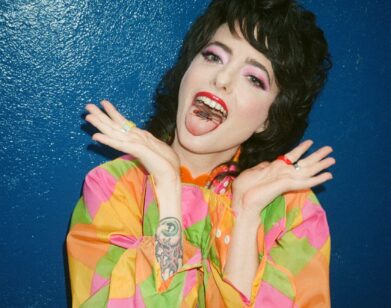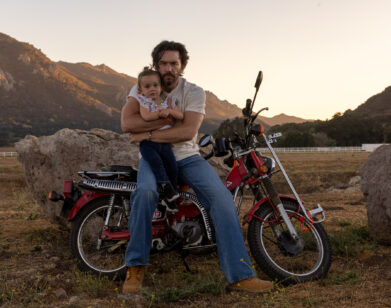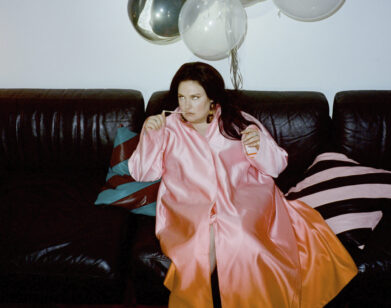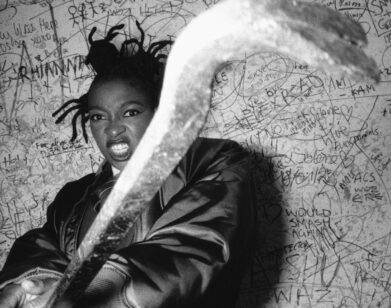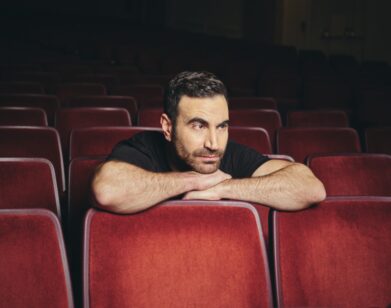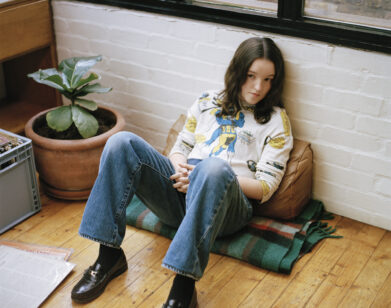q&a
Brit Bennett On the Danger of Symbolic Band-Aids
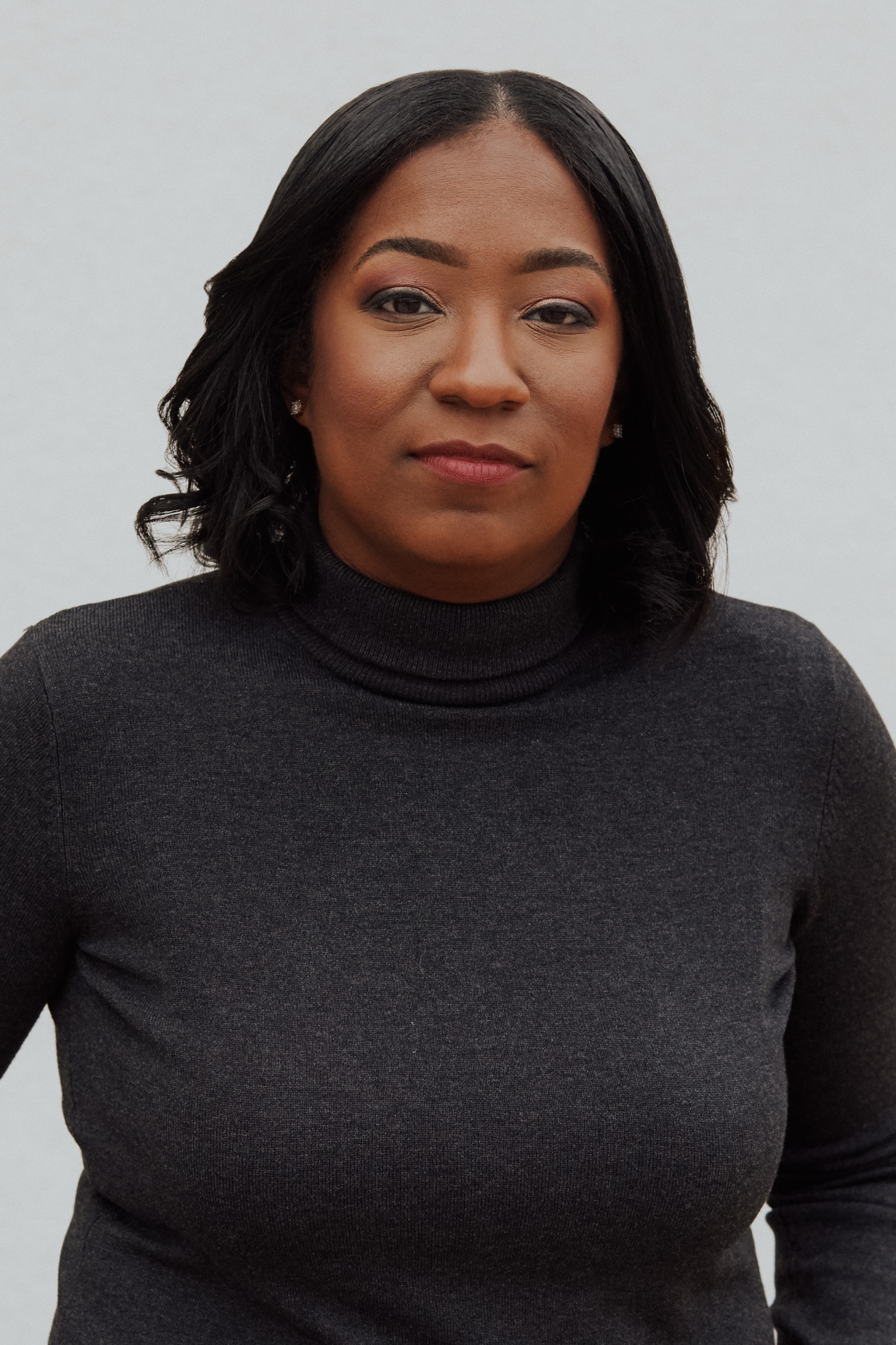
Photo by Emma Trim.
As with many of our present-day conceptions of America, flattering or otherwise, the story was born from myth. The novelist Brit Bennett hears her mother recall a rumor from her childhood in the Jim Crow South about a town inhabited entirely by light-skinned Black people. Though she tried for years, Bennett has never been able to locate the exact town her mother describes. But whether this place exists is almost irrelevant, because, like any myth, its specter embodies the material anxieties of that era. This was the genesis of Bennet’s latest novel, The Vanishing Half.
The Vanishing Half tells the saga of the Vignes family, whose ancestors founded the town of Mallard, Louisiana, on the principle that each generation would appear “lighter still, like a cup of coffee steadily diluted with cream. A more perfect Negro.” Still, the advantages afforded by a lighter complexion run only skin-deep. As children, twin sisters Desiree and Stella witness the lynching of their father by a gang of white men. As teenagers, the girls are taken out of school by their mother to help her clean white people’s homes. Restless and ambitious, the sisters flee to New Orleans, where their paths dramatically diverge. Desiree would one day return to Mallard holding the hand of a girl with “blueblack” skin, and Stella moves to California to live the rest of her life as a white woman.
In The Vanishing Half, only her second book, Bennett confidently enters the arena of the intergenerational novel and literature of passing. Her omniscient narrator relates scenes of cruelty and kindness vividly and without moral appraisal, presenting each character’s humanity in its contradictory fullness. In a genre beset by tragedy, Bennett shows unabashed tenderness. Desiree bites into a fig where a suitor’s mouth had just been; in another instance, she takes her sister’s finger in her mouth to nurse her cut. From several perspectives, Bennett interrogates the very concept of identity. Apart from Desiree and Stella, she explores the lives of a trans man, a drag performer, and a soap opera actress. Is identity an individual pursuit or a social contract? Bennett says it’s both and more. Like the myths that make up a nation, the shape of one’s identity is ever-changing, insatiable, and alive.
The week of Bennett’s 30th birthday, barely a month after the publication of The Vanishing Half, a bidding war erupted over the rights to the novel’s TV adaptation. Out of seventeen competitors, HBO emerged the victor, with Bennett set to executive produce the limited series. She hopped on the phone from her parent’s backyard in San Diego to discuss the unforeseen timeliness of The Vanishing Half, America’s cyclical reckonings with racial justice, and the dangers of symbolic change.
———
MICHAEL LONDRES: How are you doing? Where have you been quarantining?
BRIT BENNETT: Right now, I’m in San Diego. I just finished my 14-day period of isolation, so before, I could only talk to my parents from across the yard. It feels good to be able to interact with humans again. I was in New York since March and hadn’t really left my apartment.
LONDRES: Now you have all that gorgeous weather to enjoy. It’s been either rainy or humid in New York.
BENNETT: Yeah, they have a backyard. I’ve been able to sit outside and drink coffee, and it’s not muggy out here. Just a dry heat. So that’s nice.
LONDRES: What’s been getting you through quarantine? What have you been reading?
BENNETT: I really loved [Emily St. John Mandel’s] The Glass Hotel. That book revitalized my attention span when I was struggling to finish anything. I couldn’t concentrate on anything that wasn’t one despairing tweet after another. It’s very propulsive and you really can’t put it down. I started the new Isabel Allende book [A Long Petal of the Sea]. It’s set during the Spanish Civil War, so very brutal. But her writing at the sentence level is so beautiful, and the scope is always enormous.
LONDRES: What about binge watches?
BENNETT: I was doing a lot of HBO at the beginning of quarantine. I watched Euphoria. I hesitated on it because I thought it was going to be just teens being reckless, and obviously, that’s a big part of the show, but there’s also a lot of tenderness. I finally watched Succession. I felt like the last person in the known universe to watch that show. I watched Westworld, and that was also a very brutal show, but so immersive. There was something nice during quarantine of just these beautiful shots of deserts. I’m behind, but I’ve been watching Michaela Coel‘s show, I May Destroy You. I think it’s brilliant.
LONDRES: I’ve been waiting to start it, but I really need to.
BENNETT: It blows my mind because of the tonal shifts you swing between. When I first heard the premise, I was like, “This sounds harrowing. I don’t know if I can do this.” But when you watch it, it doesn’t feel that way. It manages to be heartbreaking and embracing. I love Chewing Gum, so that’s been really fun.
LONDRES: Speaking of HBO, how did it feel to land the deal to adapt The Vanishing Half the week you turned 30?
BENNETT: It was the wildest week of my life. I had a surprise Zoom party. I have a friend in Seoul and friends in Minnesota and we had to manage all the time zones to do it. The rest of the week, I was taking these TV calls. It’s all just completely surreal. You write a book and you hope that people connect to it, but I don’t think anyone on my side of things imagined that there would be this much enthusiasm. We had so much interest from so many great places and we had to weigh our choices. HBO felt right for me for this project.
LONDRES: What was it like having The Vanishing Half come out to a world that is both unrecognizable and, in a lot of ways, an echo of the 20th century America of the novel?
BENNETT: It’s strange. I started writing this book four or five years ago, and I didn’t imagine that it would be called timely when it came out. The questions the book is asking about identity and the implications of race have had echoes in different periods, but there was something very particular about the moment when the book emerged in which people decided that they were going to turn to books. It didn’t have to be books. It could have been movies. It could have been TV. But the fact that people decided they would turn to books and that mine was going to be the one that would somehow refract the moment in a different way, I certainly didn’t anticipate any of it.
LONDRES: You’ve talked about being asked why your debut, The Mothers, a coming-of-age story about Black teens is set in Southern California and not in the South or some urban setting, when the novel is not explicitly or exclusively about race. Why did you decide to tackle race and racism head-on in The Vanishing Half?
BENNETT: I started working on The Vanishing Half before The Mothers came out, and I actually had some ambivalence once I began to have conversations with people because, though most readers were enthusiastically supporting it, I would get a lot of dumb questions about race. There was a part of me that was like, why are you directly writing about race after you wrote a book that was not directly about race? You are going further into that direction that is going to lead you to questions that you hate. But, at that point, I was already pretty entranced by the story and I was in a little too deep to extricate myself. So, I just went full steam ahead.
LONDRES: What clichés did you want to avoid, and what new avenues were you interested in exploring?
BENNETT: I knew I was writing into a tradition of passing literature, and I wanted to honor that. But at the same time, I wanted to write from my vantage as a 21st century young person. A lot of these stories are historically moralizing, where the character who passes is punished. There’s a scene in [Fannie Hurst’s] Imitation of Life where the white-passing character gets exposed by her boyfriend and he beats her brutally. I didn’t want that. Something about that doesn’t sit right with me, us reaffirming that these boundaries between races are immovable. Passing literature often is an inherently melodramatic form, and that was something else I wanted to think about. I wanted to avoid melodrama, but I also wanted to lean into it. That’s one reason why there’s a character who becomes a soap opera actress.
LONDRES: In the novel, Black characters clash and coalesce on issues of race, colorism, and class, with white characters and other non-Black characters peripheral to the drama. What nuances emerge when you get to have these conversations within a community?
BENNETT: I think particularly in a book like The Vanishing Half, which, again, is more explicitly about race, a lot of white readers expect the central conflict to be Black versus white, and that wasn’t a conflict I was even that interested in. This idea of colorism—that’s the conversation that I’ve witnessed within Black communities my whole life, and there is something exciting to me about exploring the nuances of that. By focusing on this Black community and thinking about these Black characters who are all trying to figure out how to be people and how to move through this world, I feel like that has allowed me to dive into some different conversations and think about these relationships and themes in a way that I don’t know that I would be able to do if I had to constantly have conflicts between white and Black characters.
LONDRES: A common burden for writers of marginalized or at least politicized identities is how to write trauma and tragedy without overdramatizing them, or daring to write about joy without it feeling contrived. How do you navigate this tricky terrain as a writer?
BENNETT: I try my hardest not to sensationalize these moments of violence or trauma. I’m the type of person that cannot directly look at them. It’s hard for me to watch something that has a rape scene in it. It’s hard for me to see police shootings and things like that coming down the timeline. I never watched the George Floyd video. What scares me about the ubiquity of those videos is the assumption that people have to see something like that with their own eyes to realize that it’s wrong or that it’s a problem. There’s also the aspect of, “Do we become desensitized to this type of violence because it’s looping around us at all times?” There’s a lynching in The Vanishing Half that the twins witness through a crack in the door, and that’s how I have to look at those moments. I find that rendering violence in fiction can be so much more brutal by not looking at them directly. I’m always more interested in how trauma lingers than the actual traumatic event. And about representing joy, I wanted to think not just about violence, but how characters try to move forward. The idea of people trying to learn how to trust and love even though they’ve been given reasons not to.
LONDRES: What were your inspirations for Reese [the trans character in the novel]? It was refreshing to read about someone transitioning in eighties L.A., someone who didn’t have the liberties or language we have today around gender identity and expression.
BENNETT: This book was challenging in a lot of ways because I was writing about times and places in which I was not alive and within these different perspectives. There’s this terrible lack of representation in fiction for trans characters, so I really wanted to write Reese in a way that felt complex and responsible. I drew on some nonfiction writing by trans men from the ’70s and ’80s, and I consulted with a friend who’s a scholar of trans lit and history. I wanted to acknowledge the challenges that Reese would be facing accessing the healthcare that he needed, and also the language, as you said, of coming to think about himself. A lot of times when cis people write trans characters, we become so fascinated with just transitioning, and there can be this gross and dehumanizing focus on characters’ bodies. I wanted to write this love story with Reese and Jude, and I didn’t want Reese being trans to be a conflict in the relationship. Really, the conflict is that they’re broke and that is an impediment to Reese getting the healthcare he needs and to Jude doing the things she wants to do. I wanted to write about these two people who find each other and are struggling to learn how to trust and love because they’ve faced so much violence and shame in their lives.
LONDRES: You wrote your essay “I Don’t Know What to Do With Good White People” for Jezebel around the time the police officers who killed Eric Garner and Michael Brown were not indicted. We find ourselves in a similar moment following the killing of George Floyd. Where do we go from here?
BENNETT: You know, I don’t know. I remember when I was writing that essay, everybody was still thinking, “Oh, body cameras will be the solution.” To see people talking about defunding police, there’s a way in which that conversation has advanced. But the thing that troubles me is that a lot of the changes we’ve seen have been symbolic. I think that symbols matter, but symbols also are not everything, and I’m worried that when we look back on this moment, we’ll say, “Well, we got rid of Aunt Jemima,” and that will be where we land. You think about the Washington football team fighting for years, holding on to that mascot, and there’s something frustrating, almost gaslighting, about seeing these things change so quickly. It couldn’t have been that important if you could just change it with the snap of your fingers.
LONDRES: It’s like, things appear to be changing on the surface, but what do these gestures really mean for people’s lives in the long-term?
BENNETT: Exactly. My most cynical interpretation is that it’s just rebranding. Racism has become a toxic brand, and everyone is trying to distance themselves from that brand all of a sudden. I was reading about a skin-bleaching cream out of India that was told to change the name, so they changed the name, but it’s still skin-bleaching cream. That’s what I find inadequate about focusing on symbols. All symbols are not created equally, so Lady Antebellum is not the same as a noose, which is not the same as Aunt Jemima. Symbols are also constantly reinterpreted, and it gets so slippery. It’s like the NASCAR garage photo. When does a rope become a noose? I saw people debating that for days on my timeline. That is one of the many things that’s inadequate about focusing on symbols versus actually changing institutions. Obviously, it’s much easier to rebrand Aunt Jemima than it is to reform policing.
LONDRES: What about that cringe-inducing moment where Democratic leaders sported kente scarves and kneeled for the same amount of time the police officer had his knee on George Floyd’s neck, the act that killed him?
BENNETT: I couldn’t even look at it. I saw the memes flying, and that was as far as I could engage with that. Nobody asked for that. We are asking you to actually do the hard work of trying to reform these institutions. Maybe it’s not the part that makes you feel warm and fuzzy, but that’s what people are asking for and that’s what we need to do. My fear is that we will look back at this moment two years from now, five years from now, and all we’ll have to show for it are these symbolic Band-Aids.
LONDRES: A related topic is this conversation around equity and inclusivity in industries like publishing and media. As we’ve been discussing, there are the symbolic gestures of painting over mastheads and appointing people of color to positions of power, but what do you think is happening, or should happen, in terms of making these industries more equitable for people in the mid and lower tiers, and accessible to those aspiring to break in?
BENNETT: I’ve noticed in my brief publishing career that I’ve often interacted with Black people in the lower levels. As you go up the food chain, you just see white people all the way up. I’m interested to see what the implications will be of these remote internships that publishers are rolling out and whether that will actually lead to a more diverse workforce by not requiring people to work for free in New York City. But, again, it’s one thing if you have a diverse group of interns and assistants, but are you retaining and promoting those people so that they can actually make choices that influence the industry? That’s the part that I have not quite seen. It’s troubling, when we’re talking about people turning to books, when books have guided the conversation surrounding these moments of protest, that the whole pipeline is directed by white people. Storytelling has so much power and has such a strong role in shaping the imagination. That’s something that we shouldn’t take lightly.
LONDRES: Though readers were introduced to you through your essays, you’ve said that you identify first as a novelist. What does fiction grant you as a writer and what does it offer readers, especially in times like these?
BENNETT: I keep talking about imagination. One of the books I was reading, like probably everybody, was The End of Policing. It does expand your imagination towards what is possible insofar as dramatically overhauling the criminal justice system, but I think fiction speaks to the imagination in a different way. There’s something powerful about imagining the lives of others. That’s not to say that in and of itself is enough. Sometimes we stop there, and that’s what frustrates me about some of the anti-racist reading lists, the idea that you read a Black author and you’ve done your homework and you can pat yourself on the back. That’s why I love omniscient narrators. A lot of us imagine ourselves as a protagonist but imagining that this other person who you are briefly interacting with has as complex of an inner life as you do, that’s the first step in being a compassionate person.
LONDRES: What can you tell us about the HBO miniseries in the works? What are you excited for or worried about with regard to the adaptation of your writing?
BENNETT: It can be scary to hand off your work to somebody else. I’ve never done it before. I’m an executive producer and I’m not adapting it, so I’m excited to see who the writer will be. What we have all talked about is wanting somebody who will capture the spirit of the novel but who will also translate it through their own creative vision. I’m also really excited that we have a limited series. We’ve got some space to breathe and explore the lives of these characters. I’m honestly thrilled, and I can’t wait to see what we come up with.
LONDRES: How is writing during quarantine? What’s your next project?
BENNETT: I’m working on the third novel. I was able to finish one draft during quarantine, and that’s solely because I’m very productive when I’m anxious. I finally read it recently, and it wasn’t as unhinged as I was worried it would be, given that I was writing it trapped alone in my apartment.
LONDRES: What it’s going to be about?
BENNETT: It’s about these two singers who have a lifelong feud.
LONDRES: Ooh, I love that.
BENNETT: It’s been a really fun book to write. The highlight of my quarantine was just working on it every day. Once life settles down, I’m hoping I’ll have time to jump back in.

